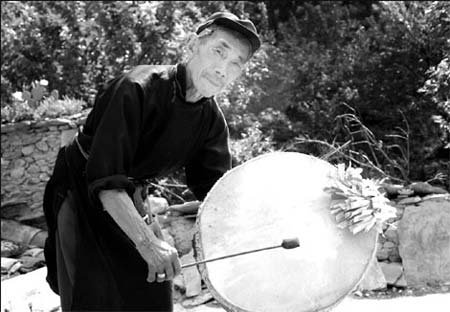
Shibi Wang Zhisheng beats goat skin drum at a burial ritual held for people died in the May 12 earthquake.(Photo Source: China Daily/Zhang Han)
Wang Zhisheng feels old and tired. At 75, he has long been grieving for his lost wife and daughter and when the earthquake took away his home and friends on May 12, the lean, tall man with gray hair wanted to end it all.
Wang is a Shibi. For the Qiang minority, one of the oldest groups in Chinese history, Shibis are communicators between man and god. More importantly, for a minority with no written language, Shibis maintain a tradition which has lasted thousands of years.
When the earth trembled, Wang was watching TV. He ran out of the house and shouted "dog, dog, dog", a chant shared by every survivor in the Qiangfeng village of Mianchi town.
To Qiang people, dog is the mother of the God of Earth. By chanting "dog", the God of Earth would stop trembling.
Yet the mountains did not heed the call and huge chunks of slopes tumbled down, generating smoldering dust that enveloped the panicking humans.
The devastation to the Qiang culture is acutely felt. Of all the places that the 32,000 Qiang people live in southwestern China, Beichuan, the country's only autonomous county for the Qiang people in Sichuan province, was totally ruined. Wenchuan, the county where Wang lives, also suffered heavy losses as the epicenter of the 8.0 magnitude earthquake.
Wang is the younger of a Shibi's two sons. His brother was the one to whom the family heritage would be bequeathed. But his brother wasn't interested in the Shibi culture and preferred to do something else.
The father accepted the fact and decided to pass on his knowledge to Wang. After a hard day's work in the fields, the father and son would chant ancient scriptures while others chatted away the wintry days around the family hearth.